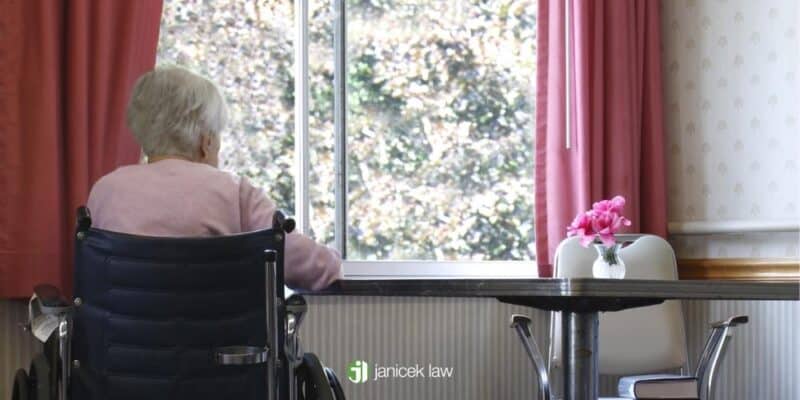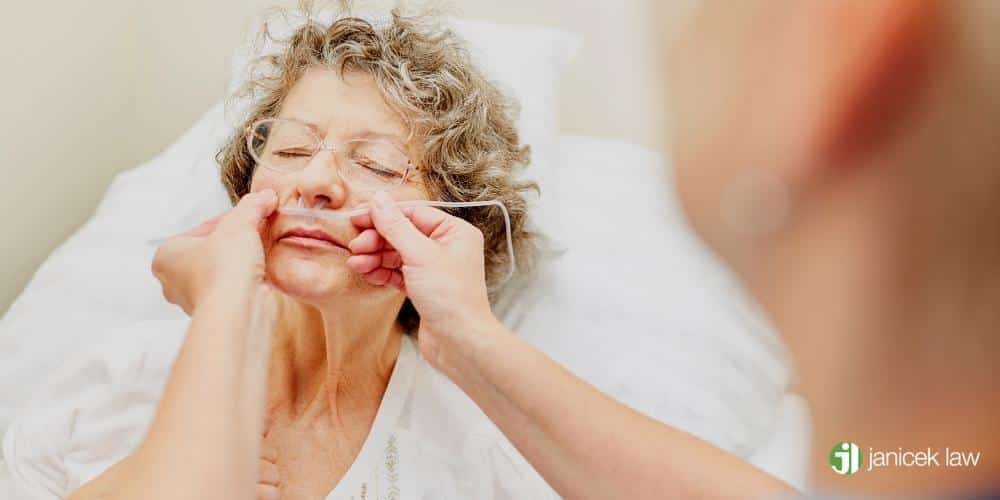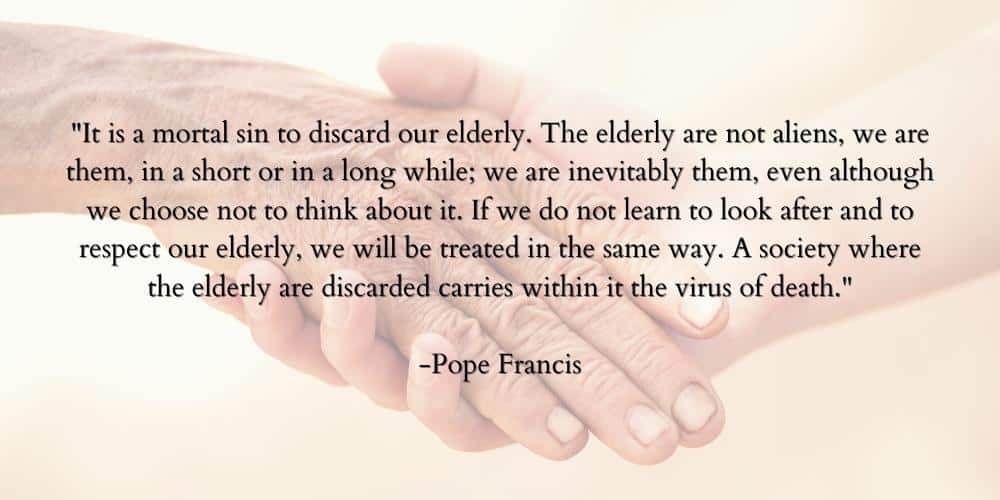MRSA in Nursing Homes
Home » San Antonio Nursing Home Abuse Lawyer » Nursing Home Abuse and Neglect » MRSA In Nursing Homes
San Antonio Nursing Home Neglect Lawyer
Methicillin resistant staphylococcus aureus (MRSA) is a skin infection that, without timely and proper treatment, can easily spread to other parts of the body. This type of staph infection is unique because it’s resistant to many common antibiotics. Many people think of this staph infection as rare and only occurring in health care facilities, and this isn’t true. The Centers for Disease Control and Prevention (CDC) claims that up to 33% of people are carriers of this common bacteria in their nose. It’s important to note that carrying this bacteria isn’t the same thing as being infected by this bacteria. Some people have a higher risk of developing a MRSA infection than others, and carriers can easily infect these people through skin-to-skin contact. Elderly people are one of many types of people who have a higher risk of developing MRSA infections. This means that MRSA in nursing homes can be a major problem not only for the residents but for the healthcare workers too. Below, the legal team at Janicek Law explains how MRSA in nursing homes can be a sign of nursing home abuse and neglect.
If your elderly loved one has suffered one or more MRSA infections in their nursing facility, you have grounds to file an elder abuse lawsuit. The nursing home abuse and neglect attorneys at Janicek Law have decades of combined experience in litigating elder abuse lawsuits of all kinds. We hope to create safer and healthier nursing home environments in the future – one lawsuit at a time. Call us today at 210-366-4949 to schedule a free legal case review.

What is MRSA?
Methicillin resistant staphylococcus aureus (MRSA) is a staph infection that begins on the skin, and without treatment, can reach the bloodstream and cause death. The specific type of staph bacteria is often resistant to antibiotic treatment, which is why many people call it a “Superbug.”
MRSA bacteria exists in body parts such as the armpits, groin, nose, and buttocks.
HA-MRSA vs. CA-MRSA
There are two main types of methicillin resistant staphylococcus aureus (MRSA): hospital associated and community associated. Health care associated MRSA infections begin in health care settings like hospitals, nursing homes, and assisted living facilities. Meanwhile, community associated MRSA infections begin anywhere that’s not a health care center.
Risk Factors for Developing a MRSA Infection
Anyone can get staphylococcus aureus infections, regardless of their age or gender. The types of people who are more at risk of developing this type of staph infection include:
- People with a weakened immune system, such as elderly people or the chronically ill
- Hospital or nursing home patients
- Hospitalized people who need invasive medical devices such as breathing tubes, feeding tubes, and catheters
- People who use intravenous drugs and share needles
- Health care providers
- People who work with animals such as veterinarians, livestock workers, and farmers
- Prisoners
- Athletes
- Teachers and students at schools/daycare centers
- People with poor hygiene
- Military members
- Homosexual men
- People who have an active HIV infection
- People who live in unsanitary environments
How Many Nursing Home Residents Suffer From MRSA Every Year?
MRSA may sound like this mythical superbug that very few people can contract, but it’s more common than people think. The Centers for Disease Control and Prevention (CDC) claims that 2 out of every 100 people are carrying MRSA, and about 1 in 3 people carry MRSA in their nose. However, most of these people don’t actually develop staph infections.
Meanwhile, MRSA infection rates in nursing homes are generally high because there are multiple risk factors involved: weakened immune systems, healthcare workers, invasive medical equipment, and poor hygiene, if nursing home neglect is occurring. A 2015 study claims that as many as 1 in 4 elderly patients in nursing homes carry the MRSA bacteria.
The study also claims that healthcare workers often transmit MRSA to the elderly patients through patient-to-patient contact. MRSA transmission through gloves was incredibly high in this study because many health care professionals didn’t change their gloves between patients. Gown contamination is common in nursing homes as well.
MRSA Infection Symptoms
Most MRSA infections begin as a skin rash or a set of pimples and bumps. Many MRSA patients compare their skin infections to spider bites. This rash may be red, sore, swollen, warm, and draining pus. Additionally, many MRSA patients have a fever. Invasive MRSA infections can lead to blood poisoning, kidney failure, pneumonia, and even heart issues.

Causes of MRSA Infections in Nursing Homes
MRSA spreads through skin-to-skin contact. So MRSA in nursing homes generally occurs when elderly patients contact contaminated sheets, towels, utensils, clothes, medical equipment, etc. Of course, the skin infection can occur if nursing home residents contact MRSA carriers and people with active infections as well.
The aforementioned 2015 study claims that the most common nursing home activities that lead to MRSA transmission are changing bed sheets, changing diapers, and providing general hygiene care.
Other infections – such as a urinary tract infection, a bedsore, or even infected surgical wounds – can lead to HA-MRSA infections, especially among nursing home residents. Elderly people have weak immune systems in general, so they can develop more infections than the younger population. Additionally, nursing home neglect and abuse is common in the U.S., both of which can lead to all sorts of infections, including MRSA infections.
Diagnosing MRSA Infections
Doctors will diagnose a MRSA infection by taking a skin biopsy or a pus sample from the infected wound. Additionally, doctors may take a blood sample, especially if the patient is showing signs of a serious infection.
MRSA Infection Complications
Staph infections can lead to serious complications, especially if the patient goes too long without proper treatment. Complications from a more serious staph infection include:
- Blood infections
- Wound infections
- Kidney failure
- Lung infection, such as pneumonia
- Bone and joint infections
- Endocarditis, which is a heart infection
- Sepsis
- Death
Warning signs of deeper infections can include chronic fatigue, chills, rash, shortness of breath, and muscle aches.
Unfortunately, elderly people in nursing homes have a higher risk of developing severe infections and complications due to weakened immune systems and nursing home abuse.
MRSA Infection Treatment
Doctors treat many MRSA infections with oral antibiotics or intravenous antibiotics. As you can tell by the name – methicillin resistant staphylococcus aureus (MRSA) – this staph bacteria is resistant to several common antibiotics called cephalosporins. Examples of cephalosporins include methicillin, amoxicillin, penicillin, and oxacillin. As of now, oral or IV antibiotics that don’t fall into the cephalosporin category can kill this staph bacteria.
Some MRSA infections require surgical draining or an invasive surgical procedure in order to remove the source of infection.
MRSA Infection Prevention in Nursing Homes
MRSA colonization and infection control is crucial in nursing homes. That’s because MRSA outbreaks and MRSA bloodstream infections could easily cause death among nursing home residents. Healthcare providers should take the following contact precautions:
- Maintain good hygiene by frequently washing their hands and changing their gloves and gowns between patients
- Help their patients maintain good hygiene through daily showers, hand washing, changing clothes, changing diapers, etc.
- Keep all their patients’ skin infections – such as bedsores – clean and bandaged
- Sanitize high touch areas
- Ensure that all patients have clean sheets, clean clothes, clean towels, etc.
- Isolate patients or employees who have an active MRSA infection
- Wear proper protective gear such as gloves, gowns, face shields, face masks, etc.
- Ensure that all medical equipment – such as needles, catheters, breathing tubes, feeding tubes, etc. – are properly sanitized
If a nursing home patient does happen to develop a MRSA infection, health care workers must take immediate action and treat the infection.
Can I Sue for MRSA in Nursing Homes?
If your elderly loved one has suffered from one or more MRSA infections in their nursing home, you have grounds to pursue legal action with an experienced nursing home neglect and abuse attorney at Janicek Law. Additionally, if you have evidence supporting that nursing home employees failed to treat a MRSA infection in a timely manner which eventually led to severe complications, you could certainly file a lawsuit.
Nursing home employees are supposed to do everything in their power to keep their patients safe, healthy, and content. This means that they should not only prioritize their own personal hygiene – because many people are unknowingly carrying MRSA – but the nursing home resident’s hygiene. Any type of infection, no matter how minor, can potentially be deadly to nursing home patients. Frequent infections of any kind in a nursing home should be considered unacceptable.
How to Prove Nursing Home Negligence
Nursing home abuse and neglect cases are based on the legal theory of negligence. When you hire the elder abuse attorneys at Janicek Law, we’ll help you prove the 4 D’s of negligence.
- Duty of Care: Nursing home employees owe a certain duty of care to their patients.
- Duty Dereliction: One or more nursing home employees breached this duty of care by failing to provide proper care to their patients.
- Direct Cause: The nursing home patient suffered from a MRSA infection (or a serious complication from the skin infection) as a direct result of the breached duty of care.
- Damages: The nursing home patient and their family suffered a variety of damages – such as medical bills, pain and suffering, emotional distress, or even wrongful death – for which they deserve fair compensation.

